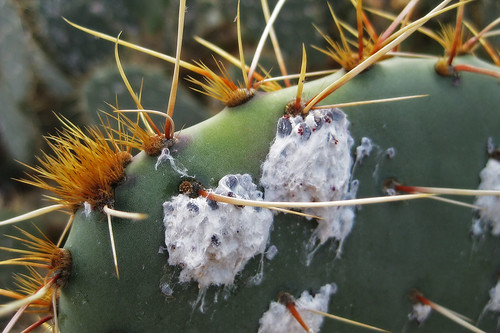When you look at the white spot covering on Opuntia, do you think it's from fungus or insect? The answer is from an insect infestation. The white sticky mounds are the housing for cochineal bugs (also known as mealy bugs.
The white sticky mounds are the housing for cochineal bugs (also known as mealy bugs) All of the host plants of cochineal colonies were Opuntia species. Cochineal feed on plant moisture and nutrients.
Like the aphid (a related insect) the female drives her
tubular proboscis through the cactus skin, where she will remain affixed for
the rest of her life, sucking out the juice. Simultaneously, she produces
a white, waxy, fungus-looking coating that will help protect her from predatory
insects and birds and shade her from the desert sun. However, she sometimes fall prey to a rare carnivorous caterpillar and more commonly, to our
good friend, the ladybird beetle. Over time, a heavy cochineal
infestation can kill its resident plant.
However, Cochineal has industrially important insects because Cochineal can produce scarlet, orange, and other red tints. The colors are produced from carminic acid which is today primarily used as a natural dyeing for food, pharmaceutical and cosmetics industries . And seriously, there are cochineal farms for export in some countries such as Peru, Australia, Mexico, Chile.
If you don't want cochineal on your healthy plants, it’s
suggested to treat the damaged areas by
scrubbing them with insecticidal soap or unscented dish soap. In small areas
you can scrub with a tooth brush but for larger areas it is best to use a long
handled brush. Or you can just spray all of the surfaces of the prickly pear pads
thoroughly using a power nozzle attached to your hose and then thoroughly spray
with a solution of spectraside and insecticidal soap. Do not rinse after
applying the spectraside and insecticidal soap.
source: http://www.desertusa.com, http://www.thecactusdoctor.com, http://en.wikipedia.org


No comments:
Post a Comment